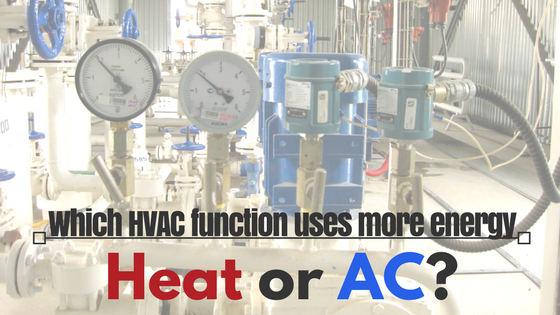According to the U.S. Energy Information Administration, energy consumption in the industrial sector accounts for about one-third of our nation’s energy use. Considering the rising demand particularly for air conditioning and refrigeration systems in industrial facilities as well as in commercial and public buildings, energy waste as well as energy bills will continue to increase over the next few years.
In this context, finding out whether the heating or cooling function of an HVAC system uses more energy can help building owners, managers and operators select the most appropriate energy-efficiency measures for their buildings and save money.
Although both cooling and heating a space require large amounts of energy, it usually takes more energy to heat an area than to cool it. In addition to the fact that the thermal capacity of materials, including the air in a room, determines the amount of heat the material must absorb in order to increase its temperature; it takes less energy to transfer heat (the cooling function) than to generate it (the heating function).
How HVAC Systems Work
HVAC units combine four main components, which are matched to work together.
A Central Cooling System
During the warm season, air conditioning systems bring the temperature down to pre-set values, providing improved comfort levels in areas that heat up due to direct exposure to sunlight, hot air from outside or thermal loads resulting from different operations.
A Central Heating System
In the winter, the heating system increases the indoor temperature to compensate for any heat loss between interior and exterior environments.
Air Filter
As an integral part of HVAC systems, the air filter improves indoor air quality by filtering dust and pollutants.
Thermostat
A programmable thermostat is typically used to control HVAC units along with temperatures and humidity levels throughout buildings, according to daily activities.
It’s worth noting that a series of additional factors can also determine the energy use of an HVAC system. Some of these are:
- The HVAC unit itself, which must be sized correctly in order to provide efficient cooling, heating and moisture control where it is required;
- The design and operation of the building, which dictates the impact of the exterior environment on the interior environment;
- Improper building design and/or construction defects that could lead to air leaks;
- Internal thermal loads generated by people, lighting, equipment and certain activities;
- Direct sunlight, humidity levels, ventilation, activities performed and the clothes people wear, which can affect their perception of how warm or cold a space feels. As an example, a hotel or an office building will have different heating, cooling, and ventilation needs, compared to an industrial facility where workers perform heavy work and wear PPE and safety gear specifically designed for industrial environments.
Considering the intended use of each area and assessing the thermal loads associated will allow a better understanding of where heat energy is gained and lost in a building. This is a critical step toward successful passive heating, cooling, and ventilation, which can make your HVAC system more efficient.
In addition to reducing energy consumption, a more efficient HVAC unit will cycle on and off less frequently, which will extend the service life of all components, including that of the compressor. As compressor failure can turn into a critical problem in an HVAC system, extending its life can go a long way toward preventing unexpected repairs, facility downtime, and additional expenses.
If you’re looking for an efficient, factory-new or remanufactured compressor, please feel free to call our experts directly at 972-826-2264 or fill out our contact form so we can get in touch with you and answer any questions you may have.












